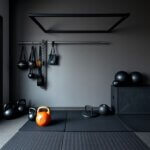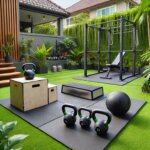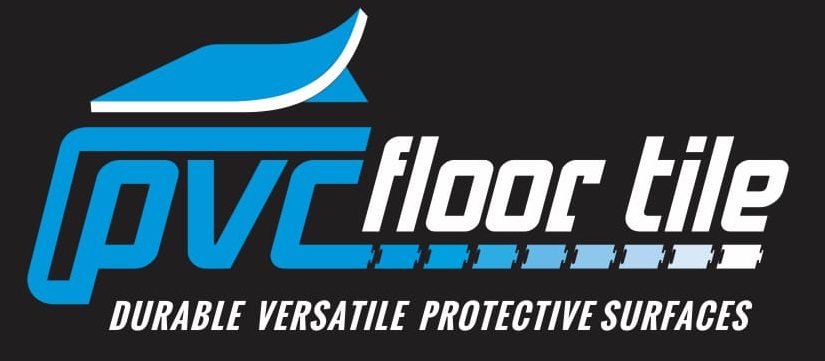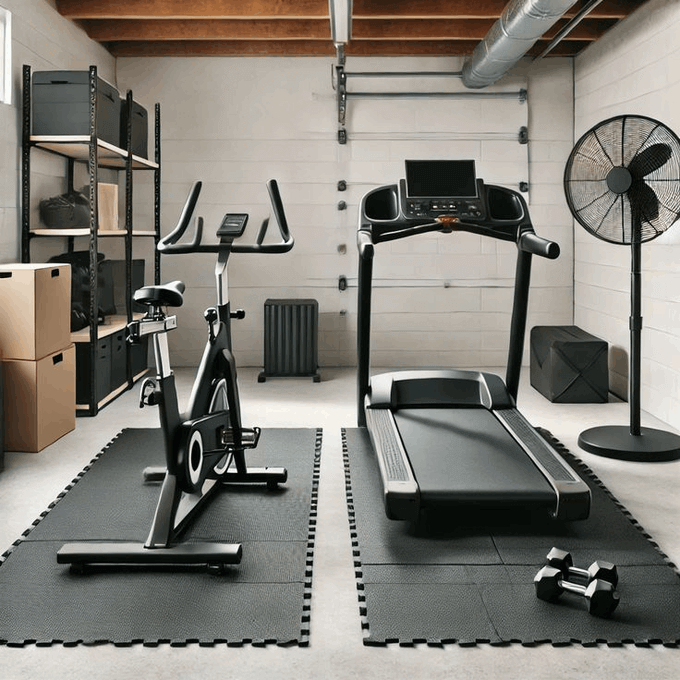Select the Best Tiles for the Floor
Choosing the most suitable tiles for the floor is essential, as it greatly influences both the functionality and visual appeal of any space. Whether you are considering flooring options for a gym, garage, outdoor patio, or even a shower, understanding the various materials and their specific advantages can help you make the most informed decision. PVC floor tiles, rubber mats, and rubber rolls are versatile and durable solutions that cater to a wide range of flooring needs. This article will delve into the differences between these options, their benefits, and the installation processes to ensure you make a confident choice.

Rubber Mats
- Sizes: Rubber mats are available in smaller, pre-cut sizes that are convenient for individual spaces.
- Thickness: They tend to be thicker, providing superior cushioning and shock absorption, making them ideal for high-impact areas.
- Portability: Their manageable size makes them easy to move and reposition as needed.


Rubber Rolls
- Sizes: Rubber rolls come in larger, continuous lengths, making them better suited for covering extensive areas seamlessly.
- Installation: They typically require adhesives or double-sided tape to secure them in place, ensuring a stable and uniform surface.
- Seamless Look: Rubber rolls create a smooth, professional appearance with minimal visible seams, which is particularly beneficial in commercial settings

Tiles for the Floor Key Comparison
| Features | Rubber Mats | Rubber Rolls |
|---|---|---|
| Ease of Installation | Simple, no adhesives required | Requires adhesive or tape |
| Coverage Area | Small to medium spaces | Large, open areas |
| Portability | Easy to relocate | Fixed once installed |
| Cost | Higher for small quantities | More cost-effective for large spaces |
Tiles for the floor Slip Resistance
Ensuring slip resistance is a critical factor when selecting flooring, particularly in areas prone to moisture or heavy foot traffic. Rubber mats, rolls, and PVC tiles for the floor are engineered to provide excellent grip and traction, making them an ideal choice for enhancing safety in various environments. Here are the key considerations:

Indoor Flooring
- Gym Floors: Slip-resistant properties are vital for gyms to prevent accidents during intense workouts, ensuring safety and stability for users.
- Garage Floors: Rubber or PVC tiles for the floor help reduce the risk of slipping on oil, water, or other substances commonly found in garages.
- Kitchen Floors: Anti-slip tiles for the floor in kitchens are particularly beneficial for preventing falls in areas that frequently encounter spills or moisture.
Outdoor Flooring
- Patios and Decks: Outdoor rubber flooring options provide weather resistance and maintain a safe, non-slip surface even in wet or damp conditions.
- Playgrounds: Rubber playground tiles offer a soft, slip-resistant surface that ensures children’s safety while playing.
- Walkways: Durable and wear-resistant, these tiles are excellent for high-traffic walkways where safety and longevity are essential.
Shower Floor Tiles
- Specifically designed for wet environments, shower floor tiles feature textured surfaces to enhance grip, minimizing the risk of slipping.
- Resistant to mold and mildew, these tiles maintain hygiene standards while being easy to clean and maintain.
- Their durability ensures that they can withstand constant exposure to water and heavy use.
Installation Guides of Tiles for the Floor
Proper installation is crucial to ensure that your flooring performs well and lasts for years. Below, you will find step-by-step guides for installing rubber mats, rubber rolls, and PVC interlocking tiles for the floor, covering everything from preparation to final touches
- Prepare the Surface: Start by ensuring that the floor is clean, dry, and level to allow for smooth installation.
- Plan the Layout: Arrange these tiles for the floor in your desired pattern to determine the optimal placement.
- Cut to Fit: Use a utility knife for precision cutting around corners and edges.
- Lay the Mats: Place the mats carefully, ensuring they fit snugly together without gaps.
- Secure the Edges: For added stability, use double-sided tape to keep the mats in place, especially in high-traffic areas.
- Installing Rubber Rolls
- Measure the Area: Calculate the amount of material required, factoring in extra length for trimming.
- Clean the Surface: Remove dirt, debris, and moisture to create a smooth foundation.
- Apply Adhesive: Spread a thin, even layer of adhesive or use double-sided tape for securing the rolls.
- Roll Out the Material: Start at one end and gradually unroll the rubber, pressing it down to eliminate air pockets.
Popular rubber Floor Tiles
- Interlocking Rubber Tiles: These tiles for the floor are designed with interlocking edges that make them easy to install and remove without the need for adhesives, making them a versatile choice for gyms, playrooms, and workshops.
- Rubber Gym Tiles: Specifically built to withstand the impact of heavy equipment, these tiles provide excellent shock absorption and noise reduction, making them ideal for home and commercial gym setups.
- Recycled Rubber Tiles: Manufactured from recycled rubber materials, these eco-friendly tiles are durable, versatile, and suitable for both commercial and residential applications, contributing to sustainability.
- Outdoor Rubber Tiles: Made to resist harsh weather conditions, these tiles are perfect for outdoor spaces like patios, playgrounds, and walkways, offering a non-slip surface for enhanced safety.
- Rubber Playground Tiles: These thick, impact-absorbing tiles are designed to cushion falls, making them a safe and colorful option for children’s play areas and schools.
- Rubber Garage Floor Tiles: Engineered to resist oil, grease, and stains, these heavy-duty tiles are perfect for garages as they can support the weight of vehicles and endure high levels of foot traffic.
- Anti-Fatigue Rubber Tiles: Featuring a cushioned surface, these tiles reduce strain on the feet and back, making them an excellent choice for workstations, standing desks, and kitchen areas.
- Rubber Sport Court Tiles: Designed specifically for sports and recreational use, these tiles offer superior traction and shock absorption, enhancing performance and reducing the risk of injury.
- Rubber Mats with Drainage Holes: With perforated designs to allow water to drain through, these tiles are ideal for wet areas such as kitchens, showers, and pool decks, preventing slips and maintaining hygiene.
- Rubber Acoustic Tiles: These dense and thick tiles are specially crafted to reduce noise levels, making them a popular choice for gyms, music studios, and high-traffic spaces where sound insulation is needed.
Additional Resources
- Maintenance Tips: Learn how to extend the lifespan of your flooring through proper cleaning and care.
- Buying Guide: Explore comprehensive comparisons of various flooring materials to find the perfect fit for your space.
- DIY Installation Videos: Access detailed video tutorials to simplify the installation process and achieve professional results
Tiles for The Floor Frequently Asked Questions
What is the lifespan of rubber flooring?
With proper care and maintenance, rubber mats and rolls can last anywhere for more than 5 years, depending on usage and environmental conditions.
Are PVC tiles suitable for outdoor use?
Yes, PVC tiles are highly durable, weather-resistant, and designed to withstand outdoor conditions, making them ideal for patios, decks, and walkways.
Can I install these tiles on uneven surfaces?
It is recommended to level the surface before installation to ensure optimal performance and durability of the flooring.
How do I clean rubber flooring?
Regular cleaning with a mild detergent and damp mop is sufficient to maintain rubber flooring. Avoid using harsh chemicals that may damage the material.
Are these tiles eco-friendly?
Many rubber and PVC tiles are made from recycled materials, making them a sustainable and environmentally friendly choice.
Are tiles suitable for all rooms?
Yes, tiles can be used in various spaces, but the type of tile matters. For example:
- Porcelain: Ideal for kitchens and bathrooms.
- Natural stone: Great for living areas.
- Vinyl: Perfect for bedrooms or low-moisture areas.
Are floor tiles slippery?
Some tiles can be slippery, especially when wet. Choose slip-resistant tiles for areas like bathrooms, kitchens, or outdoor spaces.
Can tiles be installed over existing flooring?
Yes, in some cases, tiles can be installed over existing flooring like vinyl or concrete, provided the surface is clean, level, and structurally sound.
Enhance Your Space with Premium Tiles for the Floor
Choose high-quality tiles for the floor to enhance safety, durability, and design. Explore various options to suit your needs and create a lasting impression in any space.
For premium tiles for the floor, visit PVC Floor Tile.
👍 GOOD TO KNOW
Our interlocking PVC tiles are genuine 500mmx500m, unlike many competitor’s mats which are commonly under 45cm, making them as much as 9% smaller per square metre!


